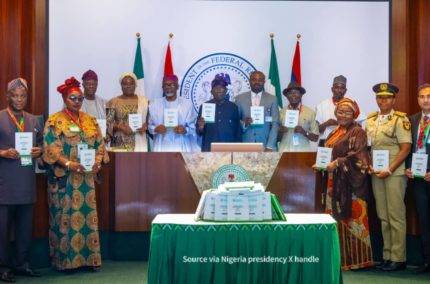President Tinubu, during a recent address at the State House, unveiled the Expatriate Employment Levy (EEL) with the aim of fostering local skill retention and technological advancement. The initiative seeks to bridge the gap between employment opportunities for Nigerians and expatriates, while also addressing disparities in wages between the two groups. The primary objective of the Expatriate Employment Levy (EEL) is to encourage the hiring of qualified Nigerians by foreign companies operating within the country, thus promoting indigenous talent and reducing dependency on expatriate workforce.
Under this scheme, President Tinubu emphasized the importance of generating revenue, promoting naturalization, and enhancing indigenization efforts. The president expressed optimism about the potential impact of the Expatriate Employment Levy (EEL) in creating more job opportunities for Nigerian citizens while ensuring fair compensation in line with global standards. However, he cautioned against using the levy as a deterrent for foreign investors, urging all stakeholders to facilitate its implementation without impeding the ease of doing business in Nigeria.
Expatriate Employment Levy (EEL): Implementation Strategy and Stakeholder Collaboration
President Tinubu underscored the need for clear guidelines and efficient implementation strategies to achieve the objectives of the Expatriate Employment Levy (EEL). He called upon officials responsible for immigration matters, expatriate quotas, and other relevant stakeholders to prioritize Nigeria’s interests and ensure that the levy contributes to the country’s economic growth and development. The president emphasized the importance of collaboration between government agencies, including the Infrastructure Concession Regulatory Commission (ICRC), the Federal Ministries of Finance, Budget, and National Planning, as well as the Central Bank of Nigeria, in driving forward the nation’s financial re-engineering efforts.
President Tinubu reassured Nigerians that despite prevailing challenges, concerted efforts were underway to steer the country towards sustainable development and prosperity. He acknowledged the commitment of all involved parties to making growth the hallmark of Nigeria’s economic agenda, signaling a positive trajectory for the nation’s future.
Upholding Development Amidst Challenges
In concluding his address, President Tinubu urged Nigerians to remain resilient in the face of adversity. He acknowledged the difficult period the nation was going through but highlighted the collaborative efforts of various government bodies and institutions in navigating these challenges. The president reiterated his administration’s unwavering support for initiatives aimed at driving economic growth, job creation, and technology transfer to empower the Nigerian workforce.
President Tinubu’s endorsement of the Expatriate Employment Levy reflects a strategic move towards harnessing local talent and fostering economic self-sufficiency. With a clear focus on implementation and stakeholder collaboration, the EEL holds promise for promoting indigenous skill development and reducing reliance on expatriate labor, thereby laying the foundation for a more robust and inclusive economy in Nigeria. Federal Government Commits to Seamless Integration of EEL Across Local Governments::
Building on President Tinubu’s vision for inclusive development, the federal government has pledged to facilitate the seamless integration of the Expatriate Employment Levy (EEL) across local governments nationwide. Recognizing the importance of grassroots participation in driving economic transformation, authorities have outlined a comprehensive strategy to ensure the effective implementation and monitoring of the scheme at the local level.
Central to this strategy is the establishment of robust frameworks for collaboration between local authorities, community stakeholders, and private sector partners. By fostering dialogue and coordination among these key stakeholders, the government aims to create an enabling environment for the successful adoption of the EEL, thereby unlocking new opportunities for employment and skills development in communities across the country.
Moreover, the federal government has reaffirmed its commitment to providing necessary support and resources to local governments to facilitate the rollout of the EEL. This includes targeted capacity-building initiatives, technical assistance programs, and financial incentives aimed at empowering local leaders and administrators to effectively administer the scheme. Through these concerted efforts, authorities are confident that the Expatriate Employment Levy (EEL) will not only promote job creation and technology domestication but also drive inclusive growth and development at the grassroots level, ultimately advancing Nigeria’s socio-economic agenda.*
Table of Contents
Discover more from OGM News NG
Subscribe to get the latest posts sent to your email.














